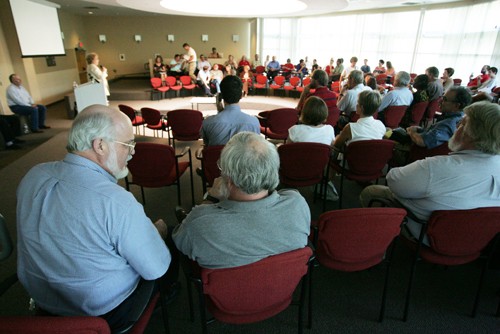Though several different voices were heard in the faculty forum Wednesday at the Student Union Memorial Center, they all seemed to agree on at least one issue: President Robert Shelton and Provost Meredith Hay are leaving the rest of the university in the dark on the UA transformation.
“”This administration has done a terrible job at transparency,”” said Lynn Nadel, chair of the Strategic Planning and Budget Advisory Committee. “”Robert (Shelton) is a good listener. He just doesn’t always hear, apparently.””
The lack of communication between faculty and the administration has led many faculty members to believe that Shelton and Hay are more concerned with obtaining federal funding and grants than maintaining the overall academic excellence of the university.
History professor Ute Lotz-Heumann said the administration is intentionally driving a wedge between the departments that are taking a 7 percent budget cut and those departments taking a 2 percent cut. “”I wouldn’t be protesting the administration’s actions if my department had taken a 2 percent cut,”” she said.
Other faculty members echoed Lotz-Heumann’s concern that the budget may be driving the UA apart.
“”No one is denying that the university is facing serious budget issues,”” said Wanda Howell, a faculty chair on the shared governance committee. “”Right now we definitely need money. Unfortunately this need has twisted the value structure we are operating on.””
The group also explored the possibility of a “”no confidence”” vote against Shelton and Hay, a measure that may be too hasty, Nadel said.
“”A vote of ‘no confidence’ would be the wrong thing to do right now,”” he said.
Regents Professor John Ulreich agreed, adding, “”The worst case scenario would be to hold a vote of no confidence among the faculty and then lose.””
While many in attendance expressed doubt as to whether or not a vote of no confidence would be effective, nearly everyone was in favor of conducting an online poll on how to address the funding crisis. The faculty in attendance also felt that a clearer set of criteria regarding prevention of future cuts was necessary.
With a projected $100 million or more gone from the state budget for education this year, faculty members acknowledged the urgency with which the administration is seeking out new streams of revenue.
However, some faculty said, the administration’s inability to involve the leaders of the academic community in the decision making process is unacceptable. “”We have to hold the administration’s feet to the fire to get the faculty engaged in financial matters,”” Nadel said.
Christopher Maloney, head of the philosophy department, said the single most important issue to address is tuition. “”We have to find an efficient way to distribute tuition dollars,”” he said.
Several faculty members argued that a higher level of participation in faculty government is needed for the administration to address their concerns.
“”We can’t make the case to have a larger role in the decision making process with only 12 percent participation in faculty government,”” Howell said.
However, others pointed out that unless the administration will listen to the faculty governance that is already in place, an increase in involvement would not change anything.
“”It’s difficult for the faculty to get involved, because when they do, they can’t help make the big decisions,”” said associate professor of English Amy Kimme Hea.
Eighty members of the faculty — out of 1,500 total at the UA — showed up to the meeting in the Kiva Room of the SUMC. Faculty members agreed that that number must grow so that Shelton and Hay will start taking the staff’s concerns more seriously. “”I’m disappointed at the total number of people here,”” Nadel said.
Overall, the faculty seemed to agree that they should not back down without a fight.
“”Budget cuts are not something you can duke out with the provost,”” Howell said. “”I’m frustrated with the notion that because we can’t get what we want, we should give up. I don’t work like that.””








